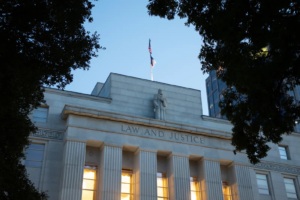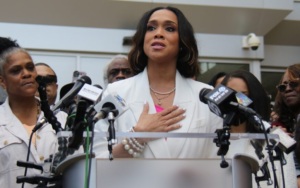State of Justice July 2024: Ethics Updates
 Concerns grow over Kentucky Supreme Court’s transparency and disclosures
Concerns grow over Kentucky Supreme Court’s transparency and disclosures
Following reporting by Fix the Court criticizing Kentucky’s lack of transparency in its judicial financial disclosure reporting, Kentucky Public Radio investigated the Kentucky Supreme Court justices’ financial disclosures. The reporting found that five of the seven justices failed to report any disclosures in 2023 and 2024. According to state law, any official who fails to report must be notified and could be removed from office. The Kentucky Registry of Election Finance (KREF), the state’s election finance agency, is charged with oversight and notification for all officials, but according to the agency’s executive director, KREF has been unable to meet the requirement due to the agency’s workload. The five remaining justices filed reports in 2024 only after they were asked about it by Kentucky Public Radio. In their reports, however, the justices are not required to include specific details about their financial disclosures. For example, the chief justice only reported that he and his wife owned over 70 stocks worth over $1,000 instead of listing the specific amounts, and vaguely described the companies by industry despite being able to freely name the companies they have a financial interest in. These judges’ failure to openly report their financial interests underscores concerns about the lack of transparency around Kentucky’s highest court. When justices are not required to disclose where and who they have a financial interest in, it deepens concerns about impartiality and a lack of transparency within our judiciaries.
 Ethical concerns continue to swell around North Carolina Supreme Court
Ethical concerns continue to swell around North Carolina Supreme Court
Recent reporting by ProPublica exposed the failure of the North Carolina Supreme Court to discipline two conservative lower court justices who violated the state’s judicial code of conduct despite disciplinary recommendations from the Judicial Standards Commission. The commission opened an investigation into two conservative judges: Superior Judge Lori Hamilton and District Court Judge Caroline Burnette.
Burnette was previously a registered Democrat but has since switched her party affiliation. Burnette was under investigation for escalating trial proceedings. During a trial, Burnette got into an argument with the defendant, who became agitated and got into a physical altercation with courtroom officials. The defendant was shot and killed by a police officer brought to testify in his trial while he was struggling with the court’s bailiff. Separately, Hamilton was under investigation for her treatment of a victim’s parent during a trial for sex crimes against minors. After accusing the mother of being uncooperative and bringing in the victims late, Hamilton put the victims’ mother in protective custody and told court staff to turn the children over to Child Protective Services. The commission found both Burnette and Hamilton violated multiple canons of the code of conduct and recommended a public reprimand when it elevated the cases to the North Carolina Supreme Court for final disciplinary measures. Normally, judges are disciplined by private correspondence, but the court disregarded the commission’s recommendations and quietly let Burnette and Hamilton off instead.
This incident occurred as the commission investigated Justice Anita Earls, the court’s only Black woman, for her comments about implicit biases within the state’s judicial system. The commission launched a long and intrusive investigation against Earls that resulted in Earls filing a lawsuit against the commission for attempting to interfere with her free speech. The commission ultimately dropped its investigation and Earls her lawsuit. But the fact that the commission targeted Earls simply for sharing her lived experience as a Black woman on North Carolina’s highest court – while ignoring serious lapses in conduct by their political allies – raises questions about the integrity of North Carolina’s judicial ethics standards as the North Carolina Supreme Court is under increased scrutiny.
The court’s conservative chief justice, Paul Newby flew an “Appeal to Heaven” flag at his beach house at the same time it was reported that U.S. Supreme Court Justice Samuel Alito had been observed flying the flag at his home in the days after January 6, 2021. Newby said he and his wife fly the flag for holidays and was only aware of the historical significance of the flag, not the current association with the far-right conservative beliefs. While this may not be a direct violation of the code of conduct, it raises concerns about Newby’s impartiality.
Similarly, the court’s two Democratic justices are under scrutiny for attending a fundraiser hosted by former attorney general Eric Holder for the state Democratic Party. Holder runs the National Democratic Redistricting Committee, a progressive litigation group fighting for fair maps and against partisan gerrymandering. While state Republican leaders accused out-of-state interests of buying the state’s judiciary, there is no evidence the justices broke the state’s ethics codes. It should be noted that conservatives benefitted from a multi-million-dollar ad attacking the Democratic candidates from D.C.-based group Republican State Leadership Committee in 2022, the year the court flipped control from liberal control to conservative control.
 Wisconsin false elector planner removed from ethics panel
Wisconsin false elector planner removed from ethics panel
A week after being charged with a felony for his role in planning Wisconsin’s 2020 false elector scheme, the Wisconsin Supreme Court removed conservative attorney Jim Troupis from his term on the Judicial Conduct Advisory Committee, the committee charged with advising judges on the code of judicial conduct. The Wisconsin Supreme Court, under a conservative majority in March 2023, reappointed Troupis to the committee. Following the April 2023 supreme court elections, now-Justice Janet Protasiewicz won election and successfully flipped partisan control of the court.
 Maryland Supreme Court temporarily allows Marilyn Mosby to retain law license
Maryland Supreme Court temporarily allows Marilyn Mosby to retain law license
Former Baltimore state’s attorney Marilyn Mosby is permitted to retain her law license while she is appealing her mortgage fraud and perjury conviction and awaiting discipline by the state court in a recent 4-2 order from the Maryland Supreme Court. Two federal juries convicted Mosby after she illegally withdrew funds from her retirement account under false pretenses under the CARES Act. U.S. District Court Judge Lydia Griggsby sentenced Mosby to home detention and location monitoring and ordered Mosby to perform 100 hours of community service and to pay $300 in assessment fees. She is currently appealing her convictions before the Fourth Circuit federal court. After her federal appeals, per Maryland rules, Mosby will be subject to a disciplinary hearing where she will likely face disbarment unless she can offer evidence to mitigate the charges.
 Georgia Supreme Court removes lower court judge
Georgia Supreme Court removes lower court judge
The Georgia Supreme Court removed probate court Judge Christina Peterson in a recent order. Peterson was first elected to the Douglas County probate court in 2020 and was serving her last year on the bench after losing re-election. Within a year of taking the bench, multiple complaints were filed against her with the Judicial Qualifications Commission (JQC), Georgia’s investigatory body for judicial and ethical misconduct. Notably, the JCQ also has the authority to review misconduct from before an individual’s time as a judge. The charges included conduct beginning in 2018 as an attorney and events that occurred while she was on the bench. During the course of the JQC’s investigation and hearing process, they found enough evidence to support 28 out of the 50 alleged violations and found 20 of the violations warranted discipline. One of most egregious violations the court found was Peterson’s treatment of a naturalized U.S. citizen born in Thailand. The individual was seeking to change her marriage certificate after she learned who her birth father was because the certificate originally listed her uncle’s name. Peterson accused the individual of contempt of court and held her in jail. The individual was able to dismiss the contempt charges by paying a fine and was released.

